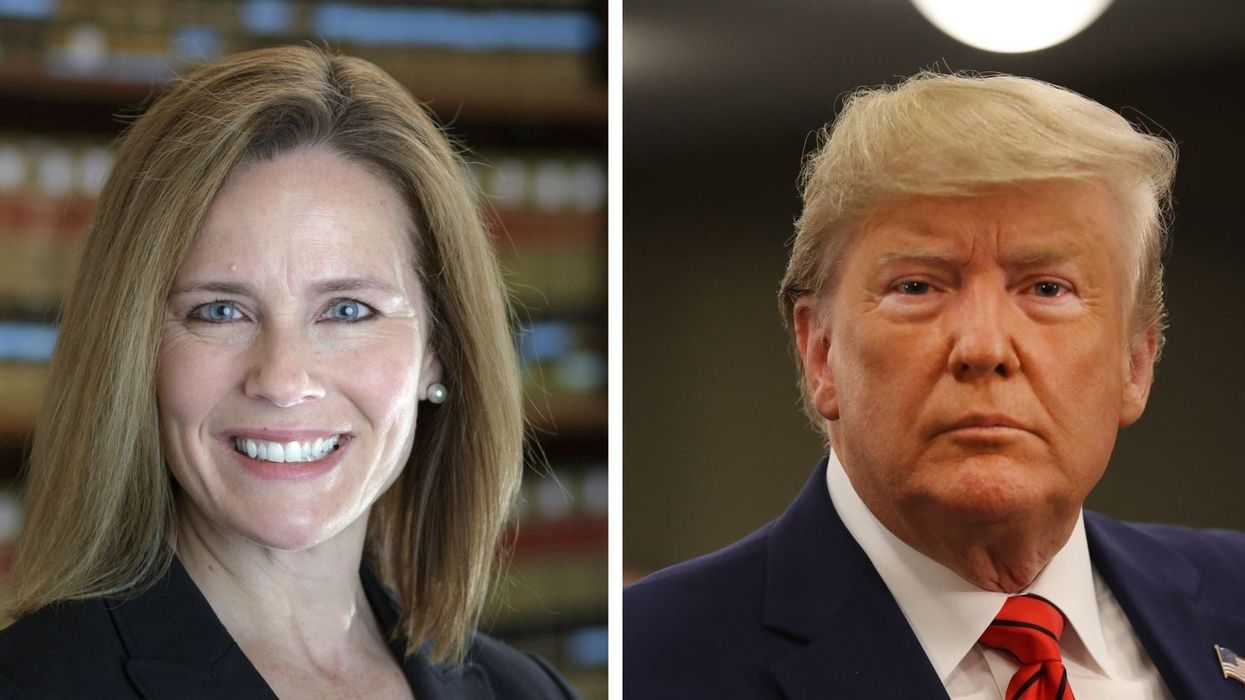Joanna Taylor
Sep 27, 2020
Trump has nominated Amy Coney Barrett to replace the late Ruth Bader Ginsburg as a Supreme Court judge.
Barrett, who is Trump's third Supreme Court pick after Neil Gorsuch and Brett Kavanaugh, is a 48 year-old mother of seven and thought to be conservative.
Her record as a Seventh Circuit of Appeals judge paints a picture of a hard-line lawmaker with conservative stances on guns, immigration and possibly abortion.
Here's five of her most controversial rulings and statements from her career so far.
1. Barrett tried to allow convicted felons access to guns
In 2019, Barrett voted against upholding federal and Wisconsin law banning convicted felons from owning guns.
Rickey Kantar, a local businessman who had previously plead guilty to mail fraud, tried to challenge these laws by claiming that his Second Amendment rights should guarantee him access to firearms as a nonviolent offender.
But Reagan-appointed judges Joel Flaum and Kenneth Ripple did not find in his favour, pointing out that those laws are "substantially related to an important government interest in preventing gun violence".
Barrett dissented, indicating support for gun rights. She wrote:
History is consistent with common sense: it demonstrates that legislatures have the power to prohibit dangerous people from possessing guns. But that power extends only to people who are dangerous.
2. She tried to deny green cards to immigrants using food stamps
Barrett dissented while her fellow 7th Circuit judges upheld a temporary blockade to a Trump policy disadvantaging Permanent Resident Card applicants receiving public assistance. This includes social and financial benefits like food stamps and Medicaid.
The judges who found in favour of the block said that immigrants would "bear the brunt" of the rule and could be put at risk of harm if they gave up preventative health care to try to strengthen their case for remaining in the US.
Commentators also pointed out that this would be particularly dangerous in the middle of a pandemic.
3. She showed possible support for a controversial abortion law
Barrett's record on abortion is under particular scrutiny because of fears that a majority Republican-picked Supreme Court could gut Roe v. Wade, the landmark case that guaranteed a woman's right to an abortion in 1973.
Barrett has reportedly made pro-life statements, but hasn't judged any major abortion-related cases. She did, however, vote to rehear a judging panel's ruling that upheld a challenge to a controversial Republican-backed abortion law in Indiana. This law would require the parents of women under 18 to be told if their daughter is seeking an abortion, even if she has asked a court to provide consent in their place.
4. She voted to deport an asylum seeker who claimed he would face torture at home
Barrett delivered the verdict that Gerson Alvarenga-Flores, a man detained trying to cross the border into the US, should be sent home to El Salvador because his claim that he was in danger there "lacked credibility".
Alvarena-Flores said that he was threatened by gang members whom he witnessed murder his friend and applied for asylum in the US under the Convention Against Torture. The judges sitting on the case found several inconsistencies in his story, as well as other issues. Their findings were supported by substantial evidence.
But the ruling was controversial: Slate cited it is evidence that Barrett "always seems to choose the harsher, stingier interpretation" of the law.
5. She voted against penalties for prison wardens who wounded inmates
John McCottrell and Dustin Clay, who were inmates at a prison in Illinois, tried to bring charges against two wardens who struck them with buckshot from their shotguns. Their case was sent back to the lower courts by the 7th Circuit because of a lack of 'material fact', but Barett sided with the wardens, upholding their defence that firing their guns was necessary as a warning shot for other inmates who were fighting.
She reportedly "relied heavily" on an internal prison report to come to her conclusion, which other judges pointed out also found the wardens had used "an unreasonable amount" of force.
Since Ruth Bader Ginsburg's death, Trump has vowed that his new Supreme Court judge will be a woman.
According to a report in Axios last year, Trump has long planned for Barrett to replace Ginsburg.
But he has been criticised for rushing the nomination through, particularly so close to a presidential election.
Ironically, when Obama filled a Supreme Court vacancy in 2016 – also an election year – Barrett said that he was trying to "dramatically flip the balance of power" and that it was "not a lateral move".
Barrett will not immediately join the Supreme Court. First, she must undergo a series of hearings and a vote which could be made complicated if Joe Biden is elected in November.
Top 100
The Conversation (0)














